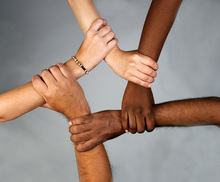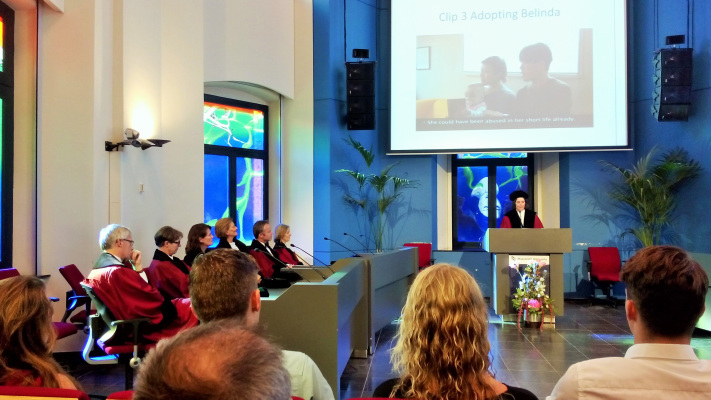 This week I attended two interesting lectures that I would like to reflect on in this blog. They were entirely different in topics and perspectives and still had much in common. The first one was a Studium Generale at Wageningen University entitled “The State You Are In” with Bertjan Verbeek, Professor International Relations at the Radboud University. Much of the talk was about Europe as the birth place of the Nation State and the power struggle between the 'Pope' and the 'King'. Certainly the definition of sovereignty as “absence of higher authority” helped in understanding this power struggle. According to Verbeek the state could be perceived as a Self Help Group. This triggered my attention as I recently have embarked on a program in the Horn of Africa that seeks to strengthen this concept of Self Help. Failed states Paradoxically, states cease to exist being a state if other states fail to recognize them (external sovereignty) even if they help themselves quite well. Subsequently they are referred to as failed states. Somalia being a case in point with Somaliland and Puntland claiming some kind of sovereignty. In the case of Somaliland it really is about the failure of recognition, primarily by its former colonial power Italy, not so much the failure of national institutions. There is quite a degree of control over territory, people and goods. The latter is known as internal sovereignty. Lack of the internal sovereignty is a much more fundamental threat to a state. It is the threat of citizens failing to stick together. In that sense there are quite a number of failed states in the making: Ukraine, Nigeria, The United Kingdom to mention a few. The personal is geopolitical This links perfectly to the subject of the second event I attended: an international symposium entitled “The Personal is Geopolitical: Story-telling and Familial Belonging in a Globalizing World”. The symposium was organized at the occasion of the inauguration of Dr. Lies Wesseling as holder of the special “Opzij” chair “Cultural Memory, Gender and Diversity” at Maatricht University. The title of her inaugural address is “The Weaving of Family: Narrative Practices and Cultural Remembrance in Transnational Adoption” a topic that is close to our heart as we also have an adoptive daughter. Her lecture pointed to the existence of fictitious narration in filling the gap that often exists for adopted children, which is often constructed by the adoptive parents. We have experienced first-hand the importance of a shared narrative, having lived as a family in Ethiopia for an extensive period, basically practicing a domestic adoption as an expat family. Around Christmas we will be spending time in Ethiopia again as a family and visit places that have shaped our shared history and sense of belonging. We will have the rare situation that our elder biological children have lived longer in Ethiopia and have more vivid memories than our adoptive daughter. When we share stories on Ethiopia she may feel less connected, even though Ethiopia is her country of origin. Hopefully our upcoming visit will bring these narratives closer together and weave our family ties stronger. At the same time the visit may trigger our adoptive daughter to more seriously consider her other identity linked to her appearance and skin colour. I suppose we would be an interesting case for quite a number of the social and/or anthropological scientists attending the symposium and having specialised in transnational adoption. Mobility and identity In a time of increased mobility, we see the control of states over its citizens decrease and multiple identities evolve as a result of migration, adoption and the like. As a result other grouping mechanisms tend to take over from the Nation State. For instance we connect quite well with expatriates who have also lived in Ethiopia. As a result religion has returned as a transnational grouping mechanism that shapes identities even stronger than before. Strange enough in the case of ISIS it seeks at least internal sovereignty as an Islamic state and therefore becomes a geopolitical reality in a strive to exercise power over people. I recognize that the Christian faith has no better record in Europe. The church has been vulnerable to this strive of power in the past. And even today the Vatican is a geopolitical reality with diplomatic ties with almost every country in the world (with the exception of countries like China, Saudi-Arabia and Nigeria). If at all ISIS manages to establish its own state it would be inconceivable for many countries in the world to maintain diplomatic ties with it. Why would the Vatican (basically a Christian State) be considered a positive force and would an Islamic State be considered a negative force? Is it not by virtue of support for universal humanitarian values and by what measure it supports them? The current Pope is quite popular due to his modesty, which helps the Holy Chair to be welcomed in many societies and even receiving broad support from secular segments of society. He shows respect for earthly authorities and international human rights while subjecting itself to a higher authority. In the case of ISIS only the latter features, straining relationships between people, segregating and condemning those who do not comply. In Europe the church has learnt from the past that such is unacceptable, though individual members and representatives of the church may still fall ill to this attitude of moral superiority. The Church’s strongest example of multiple belonging is Jesus Christ himself who humbled himself and bowed to earthly authorities while claiming that his identity and belonging was determined by another narrative, the citizenship of heaven. Fictitious or real. Comments are closed.
|
About meMy name is Reinier van Hoffen. U®Reading
Click here for a summary.
Also find the text of a lecture Dr. Achterhuis held at the 2012 Bilderberg conference. Archives
August 2022
|
AddressNachtegaallaan 26
Ede, the Netherlands |
Telephone+31 (0)6 1429 1569
|
info@uraide.nl
|

 RSS Feed
RSS Feed
















